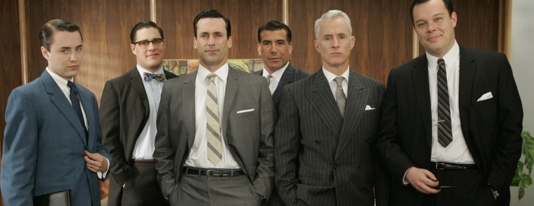Life’s never ending quest for affection is a ubiquitous struggle among all human souls. No man or woman is exempt from the pain, fear, anxiety, and happiness love can bring. It carries a level of fulfillment. “You complete me…” Jerry Maguire tells his beloved in the classic Tom Cruise movie of the same name. Love, in its various forms, can too often be misconstrued as a fallacious paradigm to conquer the fear of vulnerability: “If only I could be with this person, my life would be complete.”
Don Draper of Mad Men is searching for this fulfillment. Yet, at the same time, he cannot reveal the fact he is on a mission for affection. He needs to maintain his cool, prove his virility, and demonstrate that “macho man” mentality ever so present during the tumultuous 1960’s.
However, as the show depicts, this act is futile. Love is not a game, it is not teleological, it cannot be fulfilled with this woman or that affair. That lack, the lack we all feel that can only be fulfilled with what appears to be love, is the very goal of Don Draper. He has a hole in his soul—and hopefully he can learn how to persevere.
Don Draper is the protagonist of Mad Men, a show most critics and fans have agreed is among the best dramas in television history. The story begins in 1960 with Draper as a successful ad man at a major advertising firm. Its list of accolades is far too long to list.
Mathew Weiner, coming fresh off writing for the Sopranos, created Mad Men when it first premiered in 2007. Since then, the American Film Institute has selected it as one of the top ten television series for five years. Mad Men has also inspired a new fashion trend of 1960s nostalgia. Safe to say, then, thatMad Men’s final episodes are in fact “an end of an era.”
Don Draper: when we first see him in the pilot episode, he seems every bit as awesome and appealing as James Bond. But instead of silenced pistols and gadgets we have confidence, creativity, intelligence, and that presence that captures the imagination. But as the show progresses we learn more and more about his complexities. He’s vulnerable and has weaknesses: a troubling secret, countless love affairs, and a serious alcohol problem to name a few.
Yet, to his colleagues and friends he is the man he advertises himself to be. (Yes, pun intended.) His life is one sweet fabrication. It really is fitting he advertises products so well, because he is one giant sales pitch himself, basically advertising: “I’m tough, I can handle a liquor and smoke whenever I please, win clients with ingenuity, and sleep with whomever I want. I have it all.”
Still, it doesn’t take long for the house of cards he built his life on start to crumble. This mission, his attempt for love, is authentic. But for him to find genuine affection he must express these vulnerabilities. He must tell the truth, own up to his lying and cheating, and most importantly stop trying so hard to be a “man.” This is killing him. This is his misery.
He thought he could reject his vulnerability and his emptiness by downing whisky 24/7, sleeping with beautiful younger women, and exemplifying manliness. He thought he could figure out love and find its end. But it still wasn’t enough. He still found himself depressed.
As his story moves forward, however, he does begin to show his inner demons. He tells his second wife a dark secret regarding his true identity, shows his children the dilapidated home he grew up in, and finally hands true responsibility to his protégé and colleague Peggy. He begins to let go in a sense. He begins to accept his lack, his hole. He begins to accept his imperfections.
Now he is beginning to see love not as teleological, but as amorphous, dynamic, intuitive, and ever changing. How many times do people seek that future wife or husband but fail because he or she is not exactly what they envisioned? Draper is beginning to see love has nothing to do with precision or exactness. Draper recognizes his lack, his vulnerability, but now instead of trying to conquer or mask it, he accepts it. He embraces it.
Reality and finality are beginning to hit him as we saw in the midseason finale through death. Mortality is real. And Draper may finally be moving in the right direction. I hope he does realize, to quote Jacques-Alain Miller on Lacan, that “People in love are in fact condemned to go on learning the other’s language indefinitely, groping around, seeking out the keys – keys that are always revocable.”
Draper is not meant to congratulate the present, to think we have moved on from a past decade of misogyny, racism, sexism and fallacious virility. People gravitate towards Draper because they see in him parts of themselves, namely futile attempts to destroy anxiety and vulnerability. The mark of any good show is how its themes and stories relate to the everyday lives of viewers. Draper’s tribulations are ever present today. Who doesn’t struggle to find love because of socially conformed expectations? Who, disappointed in finding that “perfect” other, justifies debauchery instead? Don Draper? Me? You?
Not many television shows have demonstrated this capacity to explore such deep and fundamental themes at such a provocative level. The conclusion of Mad Men is the end of an era because only a few times in a generation is any art capable of such human introspection. Don Draper is finally beginning to see his lack and his futility at conquering love. Love is not something one can “conquer” no matter how noble or ignoble the motivations. Hopefully, Don Draper can start to see love in all its perfections and imperfections. Happiness is unity through difference – acceptance of a natural lack and incompletion within all of us.
Now, Don Draper is beginning to see love not as a sales pitch, but, as something more, and paradoxically, something less. To see that, as Miller wrote, “Love is a labyrinth of misunderstandings whose way out doesn’t exist.”
Mad Men premieres this Sunday at 10 p.m. on AMC.
Image courtesy of: Flickr.com / Mezclaconfusa

















































































































